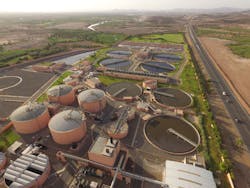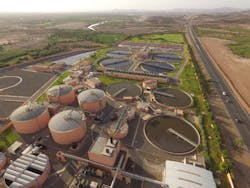Morocco's Sludge to Energy Mecca
The first integrated wastewater treatment plant in Marrakesh, Morocco generates up to 70 percent of its energy needs from sludge. A new development will see the largest solar sludge drying facility in the world built at the site.
By Ryan Johnston
With well over a million habitants, Marrakech is Morocco’s fourth largest city. During recent years, booming tourism has contributed to rapid urban and demographic growth in the city, and up until 2008, the sewage of the Marrakech-Tensift El Haouz region was disposed in the Wadi Tensift after minimal treatment. To improve its wastewater treatment process, the local water agency RADEEMA (Régie Autonome de Distribution d’Eau et d’Electricité de Marrakech) joined forces with Waterleau.
The delivered wastewater treatment process uses conventional biological water treatment technology and includes a pre-treatment (screening), a primary treatment (removal of floating and sedimentary wastes in the grit and grease chamber), a secondary treatment (degrading the biodegradable pollution of the wastewater using activated sludge) and a tertiary treatment (disinfection) making the water ready for reuse. The Marrakech plant design allows simultaneous nitrification-denitrification and the conversion of the ammonium ion to nitrogen gas in a single bioreactor, as well as the enhanced biological removal of phosphorus.
During the activated sludge process, waterborne micro-organisms eliminate biodegradable soluble organic contaminants. After treatment, the purified water is separated from the activated sludge in clarifiers, and sent back into the Wadi Tensift.
Remaining suspended solids are coagulated and filtered using sand filter beds, and then disinfected using a combination of Ultraviolet (UV) treatment and chlorination to eliminate the remaining bacteria. Once this step is complete, the water is ready for reuse and pumped into the irrigation system. The Marrakech wastewater treatment plant allows 30 million cubic metres of water to be reused for irrigation.
Sludge digestion occurs throughout all three stages of the treatment process, and makes possible the production of biogas. This is stored in methane tanks and fuels a cogeneration unit consisting of four engines, producing enough green electricity and heat to power up to 45 percent of the plants energy needs.
A plant for solar drying of the digested and dewatered sludge is still under construction near the digestion site. Each year, more than 75 tons of digested sludge will be turned by robots in large greenhouses, using vaporization to increase dry matter content from 22 percent to up to 80 percent. In order to reduce impact for workers on site and for neighboring inhabitants, 80.000 Nm³ of air/hour are treated. Volatile Organic Compounds and odors are treated using bio-filters and bio scrubbers.
The Marrakesh wastewater treatment plant covers 17 hectare, and is the largest and the first integrated WWTP in Morocco to implement wastewater treatment, sludge digestion and sludge solar drying, water reuse as well as air treatment. It is a model of sustainable development not only for Morocco itself, but for the entire region.
Ryan Johnston is the business development manager at Waterleau USA.
More Water & WasteWater International Archives Issue Articles

